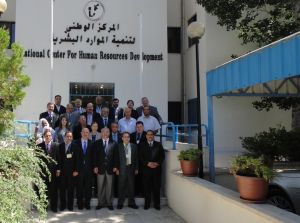
The UNESCO-UNEVOC International Centre: Who We Are | What We Do | Working With Us | Get in Touch
The UNEVOC Network: Learn About the Network | UNEVOC Network Directory
For Members: UNEVOC Centre Dashboard
Thematic Areas: Inclusion and Youth | Digital Transformation | Private Sector Engagement | SDGs and Greening TVET
Our Key Programmes & Projects: BILT: Bridging Innovation and Learning in TVET | Building TVET resilience | TVET Leadership Programme | WYSD: World Youth Skills Day
Past Activities: COVID-19 response | i-hubs project | TVET Global Forums | Virtual Conferences | YEM Knowledge Portal
Our Services & Resources: Publications | TVET Forum | TVET Country Profiles | TVETipedia Glossary | Innovative and Promising Practices | Toolkits for TVET Providers | Entrepreneurial Learning Guide
Events: Major TVET Events | UNEVOC Network News
Amman, Jordan, 2-4 July 2012
 The UNESCO-UNEVOC International Centre organized, in collaboration with the UNESCO Regional Bureau for Education in the Arab States, the UNESCO Office in Amman and the National Center for Human Resources Development Jordan
The UNESCO-UNEVOC International Centre organized, in collaboration with the UNESCO Regional Bureau for Education in the Arab States, the UNESCO Office in Amman and the National Center for Human Resources Development Jordan![]() (NCHRD), the Capacity Building Regional Workshop for UNEVOC Centres in the Arab States, which took place in Amman, Jordan, from 2 to 4 July 2012. The International Centre was represented by Mr. Teeluck Bhuwanee, Head of the UNEVOC Network.
(NCHRD), the Capacity Building Regional Workshop for UNEVOC Centres in the Arab States, which took place in Amman, Jordan, from 2 to 4 July 2012. The International Centre was represented by Mr. Teeluck Bhuwanee, Head of the UNEVOC Network.
The aim of this workshop was to reposition the role of UNESCO-UNEVOC in the Arab States, and to consider the present roles and responsibilities of the national UNEVOC centres in the region. The workshop brought a review and a clarification on the respective roles and responsibilities of the national UNEVOC Centres as part of the global UNEVOC Network and the role they are playing in the Arab region. The focus has been given to the priority intervention areas and the role UNEVOC centres should play in these areas as well as the capacity that is needed to achieve them.
The workshop enabled the participants to consider the role of the UNEVOC Centres within the national policy framework and to consider how they can be more directly involved in:
This meeting follows the recent Third International Congress on TVET![]() (Shanghai, May 2012) and the TVET Regional Expert Meeting
(Shanghai, May 2012) and the TVET Regional Expert Meeting![]() (Muscat, March 2012) and provided the opportunity to follow up on previous discussions. During the meeting, experiences were shared among participants on good practices in different parts of the region. It raised the question of regional integration through better cooperation among countries and the development of synergies between UNESCO Field Offices, the UNESCO-UNEVOC International Centre, and the national UNEVOC Centres.
(Muscat, March 2012) and provided the opportunity to follow up on previous discussions. During the meeting, experiences were shared among participants on good practices in different parts of the region. It raised the question of regional integration through better cooperation among countries and the development of synergies between UNESCO Field Offices, the UNESCO-UNEVOC International Centre, and the national UNEVOC Centres.
Among the participants were the Directors and Deans of UNEVOC Centres in the Arab region, programme specialists responsible for education/TVET from the UNESCO Regional Bureau - Beirut and other UNESCO Field Offices in the Arab region, representing Egypt, Iraq, Jordan, Lebanon, Libya, Oman, Qatar, Sudan, Tunisia and Yemen. Each participant prepared a report on the current challenges and good practices of TVET in their country, as well as an evaluation of what has been achieved by the UNEVOC centre since its inception.
Documents
Amman statement: English / Arabic
Concept note